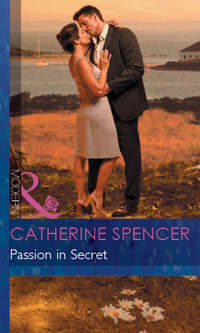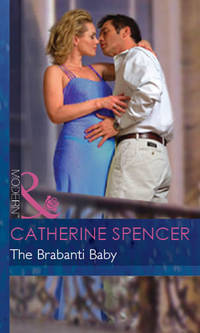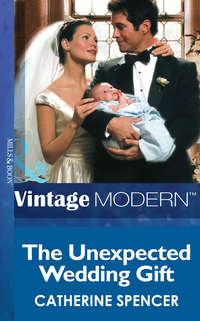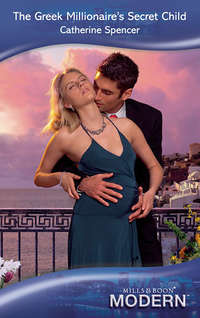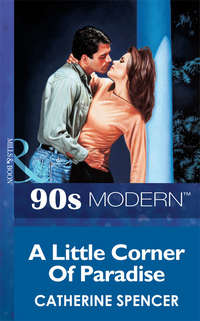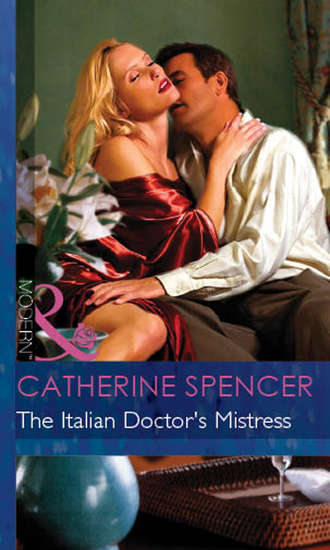
Полная версия
The Italian Doctor's Mistress
“I was just in to see your father, Signorina Blake,” she announced, flipping closed a chart. “There is no change. He remains stable but unresponsive.”
“You assisted at his surgery, I understand?”
“Si.”
“How do you rate his chances of recovery?”
Zarah Brunelli afforded her a cool, professional smile. “Exactly as my colleague reported them to you, signorina. My assessment coincides completely with Dr. Rossi’s.”
Well, what else had she expected? That a mere mortal might dare disagree with him? Not likely!
“You face a difficult time, signorina,” the doctor continued. “For your own sake, I suggest you make frequent short visits with your father, and take time for yourself. You need to conserve your strength.”
“Dr. Rossi said pretty much the same thing, yesterday. He insisted I not spend another night here.”
“He was quite right. Did you book into a hotel?”
“He did it for me, actually. Drove me to L’Albergo di Camellia and introduced me to the owners.”
Somewhat reserved to begin with, Zarah Brunelli’s manner grew noticeably more distant. “That was very good of him.”
“Yes.”
“He is a very busy man, signorina.”
Her implicit reproach was unmistakable. Carlo Rossi had more important things to do than look after women able-bodied enough to take care of themselves. “I’ll remember that, the next time he suggests helping me out.”
“Allow me to offer you a little advice,” his chief assistant responded stiffly. “Avoid the possibility of there being a next time. We have professionals on staff whose job it is to assist out-of-town patient relatives. For a referral, you have only to ask at the information desk in the foyer.”
Adopting an equally clipped tone, Danielle said, “I’ll be sure to keep that in mind, too. Just for the record, though, you should know that I didn’t coerce Dr. Rossi into helping me. He volunteered—rather emphatically, I might add. So I’d appreciate it if you’d direct your disapproval at him, the next time you feel driven to express it. And now that we’ve got that straight, I’m sure you’ll excuse me. The person I really came here to see is my father.”
She was glad to escape to his room and let the door thud softly shut behind her. Glad of the near silence, the sterile tranquility. Her heart was thudding, her breathing unnaturally fast, and she was fighting angry tears.
In the past, she’d wept buckets over things she couldn’t change. Her mother’s untimely death. Her father’s rejection—he’d made no secret of his disappointment at being saddled with a daughter instead of a son. Her broken engagement to Tom. Her supposed best friend’s betrayal. But she’d be damned if she’d let Zarah Brunelli make her cry.
Sniffing furiously, she went to the window. If her father were to open his eyes now and see the state she was in, she knew exactly what he’d say. The same thing he’d said, over and over again, when he’d made her cry as a child by poking unkind fun at her, laughing at her fears, forgetting her birthday, breaking promises…the list was endless.
What the hell kind of ninny are you, Danielle?
The answer? The kind who hurt deeply and scarred easily. But she’d learned to hide it. Learned to keep her feelings so well bottled up that even Tom, who’d once found her fascinating and desirable, had in the end decided she was incapable of real passion—or pain.
You’re frigid, Dani. That’s why I turned to Maureen, he’d said, the night he’d told her it was over between them. Sure, you’re a bit upset right now, but I’m not worried you’ll throw yourself under a bus, or anything. You’re not the type.
If she could survive that kind of crippling revelation, why was she becoming unglued over the remarks of a woman she’d only just met and whose personal opinion of her carried no weight at all? Carlo Rossi must be right: she was running on emotional overload. There was no other possible explanation.
For the next week and a half, Danielle went to the hospital two, sometimes three times a day, but the only thing that changed was the simmering awareness between her and Carlo Rossi. While her father remained to all intents and purposes dead to the world, she grew more alive inside with a bubbling vitality that shamed her.
Her father didn’t know that the tree blooming outside his window filled his room with the scent of lemons, or that the sun fell warmly on his face in the afternoon. But she had never been more conscious of the world around her; never more moved by morning birdsong, or the chattering rush of a waterfall spilling from a cleft in the hillside.
And she owed it all to Carlo Rossi. Because of the way his eyes followed her, when she came into the ICU wing. Because of the way he made her blood sing through her veins when he smiled and spoke to her in that melting, sexy voice of his. Because of the way he sometimes ran his finger inside the collar of his shirt and turned away from her, as if the heat created when their glances collided left him drenched in a sudden sweat.
Ironically, what Carlo Rossi couldn’t do for Alan Blake, he accomplished magnificently with her. Throughout it all, her father remained as before. Unmoving, unaware. Sexual magnetism might be thriving indecently between his doctor and his daughter, but medical science appeared to have ground to a halt.
For however long that might continue, Danielle remained as much a prisoner as he was, trapped in circumstances beyond her control, something she found completely unacceptable. The day Tom walked out on her, she’d promised herself she’d never again relinquish control of her life to someone else.
The trouble was, she was no more programmed to abandon her father than he’d been to foster a close and loving relationship with her. He was her parent, and much though he probably resented the fact, she was his only family. Duty obligated her to stand by him now, even if affection didn’t. So if there was the slightest chance he might make a recovery, it was up to her to find it. Because only then could they do what they’d always done best: go their separate ways.
Oddly enough, Zarah Brunelli was the one who triggered an idea, the day she happened to bump into Danielle outside the observation window overlooking Alan Blake’s room.
“It does not go well,” she remarked. “We do not see the progress we hoped for.”
Discouraged, Danielle said, “No. I might as well have stayed at home, for all the good I’m accomplishing here.”
“Not necessarily.” Zarah Brunelli regarded her coolly. “Hearing a familiar voice speaking a language he understands might be the only thing to stimulate a response in your father.”
Danielle knew it would take more than that. Alan Blake had never found his daughter stimulating company; they shared too little in common. His passions were arguing politics and discussing the justice system with his cronies at his club, or attending the opera with his latest mistress on his arm—often a woman younger than Danielle; someone who, in return for an expensive trinket or two and her photograph on the society page of the newspaper, was prepared to bat her eyelashes and prop up his middle-aged ego with flattery.
Unfortunately he didn’t confide his romantic entanglements to Danielle. She had no idea who his current lover might be, and consequently no way of bringing the woman to his bedside. The opera, however, was another matter, one she could do something about.
We have professionals to assist out-of-town relatives. You have only to ask at the desk, Zarah Brunelli had once informed her disapprovingly, and for that and her latest advice, Danielle owed her a smidgeon of gratitude now. Within the hour, she was once more headed into town, armed with a map and very specific directions for finding what she needed.
CHAPTER THREE
CASA Di Musica was situated at the top of a very steep hill leading up from the promenade. The owner spoke English about as well as Danielle spoke Italian, but opera, she discovered, was universally understood, regardless of language. She had no difficulty making her needs known, and left the shop with a CD player and enough disc recordings of the world’s favorite operas to keep the most ardent fan happy.
By then it was well past noon and the delicious aroma of food wafting from a small sidewalk trattoria reminded her how long it had been since she’d enjoyed a good meal. Settling herself at an umbrella-shaded table, she ordered a large bottle of San Pellegrino water and a plate of linguine with clam sauce.
The weather again was perfect, the scene around her delightful. Her side of the street was lively, with people hurrying in and out of the shops. But across the street, couples strolled arm-in-arm along the shaded paths of yet another of Galanio’s many parks, while young mothers pushed baby carriages or watched their children feeding breadcrumbs to the birds.
Of course, her father’s precarious condition was never far from Danielle’s mind, but just for a little while, it was nice to relax and enjoy the ambience surrounding her. Below, a ferry chugged its way across the blue lake. Above, the Alps soared against the cloudless sky.
Small wonder tourists flocked to the area for its year-round attractions. Skiing, mountain climbing, hiking, boating, swimming—Galanio had it all. The town was so picture-postcard pretty, so vital and alive, that it was easy to forget those same attractions were the cause of accident victims being rushed through the doors of L’Ospedale di Karina Rossi on a daily basis, and placed under the skilled care of Carlo Rossi.
Lifting her face to the sun, Danielle closed her eyes. Immediately, he swam to the forefront of her mind: Carlo Rossi of the beautiful hands, the stormy gray eyes, and a mouth that made her own run dry and sent a surge of excitement shooting to the pit of her stomach. What did he look like naked? Were the parts hidden by his hospital greens as sensational as the rest of him?
“Ciao! Farà caldo eggi, si, signorina?”
Startled by the proximity of the sweet, girlish voice, she bolted upright in her seat and found Anita Rossi standing on the sidewalk, regarding her curiously.
“Oh, hello…ciao!” Danielle stammered, embarrassed to be caught in such an outrageous fantasy by the daughter of the man occupying altogether too much of her attention. “It’s nice to see you again, but I’m afraid I didn’t understand you just now.”
“I said that it is hot today, yes?”
“Very.”
“Were you sleeping?”
Danielle laughed. “No. Just daydreaming.”
“I do not know that word.”
“It means I was thinking—with my eyes closed.”
“About your father?”
“Among other things, yes. He’s very ill.” Anxious to change the subject, she hooked her finger around the strap of the leather satchel swinging from the child’s shoulder. “What about you, Miss Anita? Shouldn’t you be in school?”
The girl flashed a dimpled smile. “School is done for today. We begin lessons very early so that we finish early and have time to play. I was walking home through the park when I saw you, and I came to say ciao.”
“I’m very glad you did.” Danielle glanced around. “But do you usually walk home alone?”
“I was with my friends, but they have gone now.”
I hope you didn’t come here by yourself, her father had said, when she’d burst into his office that first day. He surely wouldn’t be pleased to know she was breaking the rules now.
“Perhaps I’d better walk the rest of the way with you, just to be sure you get home safely.”
“There is no need.” Anita shook her head and sent her long dark braids swinging. “I am almost eight. I know the way, and Calandria comes every day to meet me at the gates.” She pointed to the iron gates marking the entrance to the park, half a block down the street. “She is already there. I can see her.”
“Then you’d better not keep her waiting.”
“No, I must hurry. Bianca will have missed me. You must come and see her babies, signorina. They are most beautiful.”
And so are you, Danielle thought. In fact, you’re adorable! “Perhaps before I leave, I’ll do that,” she said. “Now off you go before you get us both into trouble. Ciao, Anita!”
“Ciao!” the little girl chirped merrily, turning to wave before she stepped off the curb into the road.
She wasn’t looking where she was going. And the driver of the car barreling down the hill wasn’t paying attention. Couldn’t have been, or he’d have seen the child blithely running into his path. But Danielle saw and felt sheer horror rising up to choke her.
She tried to leap out of her chair, to streak across the few feet separating her from Carlo Rossi’s beloved daughter. Yet although her heart was racing, her limbs seemed encased in molasses so thick and heavy that she moved in slow motion.
She heard the blare of a car horn, the shriek of brakes applied too late, the stifled cries of witnesses, and her own scream of warning bursting from a throat so filled with terror that she could hardly breathe. With a superhuman effort, she launched herself at the child, grasping roughly at that tender, slender body with desperate hands, and shoving it aside at the same time that she used herself as a shield.
And then…nothing but a searing pain in her side that crushed the breath from her lungs…and blackness rising up to swallow her whole…
“I saw Danielle Blake again this morning,” Zarah said, joining him in the staff lounge for a quick cup of coffee before they started afternoon rounds together. “It’s only the second time since she arrived here. I think she goes out of her way to avoid me.”
Annoyed at the way his flesh tightened at the mention of Danielle’s name, Carlo scowled at his espresso. So much for ridding her from his system!
There’d been women since Karina died. Of course there’d been women. They, though, had been the kind he could love for a night, and leave for a lifetime. But Danielle Blake…? Without even trying, she’d worked her way under his skin. He’d seen her once, and never forgotten her, much though he’d wished he could. Without knowing the first thing about her, he’d wanted her, and never mind if she was bad or good for him.
“You’re being ridiculous, Zarah. Why would she avoid you?”
“Because she knows I disapproved that she put you to the trouble of arranging hotel accommodation for her.” She sifted her fingers through her hair, a frequent habit when she was perplexed. “I confess I’m surprised by your actions, Carlo. It’s not like you to take such a personal interest in a non-patient.”
It wasn’t like him to wake up in the middle of a too-short night and find himself so aroused that he almost embarrassed himself, either, but he wasn’t about to admit that to his chief resident. “There was nothing personal about it,” he replied mildly. “At the time, she was clearly at the end of her rope, and I didn’t want her collapsing on the ICU floor.”
“Are we talking about the same person? I find her oddly unaffected by her father’s condition, despite her claims of concern.”
Her assessment coincided so exactly with his initial impressions that he was at a loss to explain his next comment. “Appearances can be deceiving, Zarah. I suspect what you interpret to be indifference might be more accurately described as rigid self-control. It’s not in her nature to show her emotions, but that’s not to say she’s incapable of feeling.”
“I have to disagree. I don’t think she cares whether the patient lives or dies.”
You should have let him die! He’d be better off!
“You may be right. I don’t pretend to know her well.” Carlo drained his coffee cup and brushed his hands together, dismissing the subject of Danielle Blake from the conversation and from his mind. “Let’s get started. I promised Anita I’d try to make it home early for a change.”
They were entering the ICU wing when he was paged. “Looks as if you’ll be taking rounds by yourself,” he told Zarah. “I’m needed in Emergency.”
He had no premonition of what awaited him. None of the prickling anticipation of disaster he so often experienced when an accident victim was brought in barely clinging to life. Not even when he pushed open the swinging doors to the Emergency Unit and saw the troubled faces of his staff turned his way, did it occur to him that their concern was directed as much at him personally as it was for the patients awaiting his care.
“What do we have?” he asked his E.R. resident, Gino Ferrari, noting curtains drawn around two cubicles. “Another auto pileup in the mountains?”
“No, Carlo,” Gino said somberly. “This time, it happened here in town, and I’m sorry to tell you your daughter is one of those involved.”
“Anita? You’re mistaken!” Disbelieving, he shook off the statement. It was absurd. For at least the last half hour, Anita had been at home, working on her after-school assignments. A glance at the clock on the wall assured him of that.
Then the absolute silence of those around him struck, and insidious tendrils of doubt tried to take hold. “Anita?” he said again, and felt his disbelief dissolve into formless dread.
“Afraid so, Carlo.”
“Where is she?”
“In here.”
The resident pulled aside the curtain in the first cubicle. Anita lay on the high bed, her eyes closed. An ugly contusion marred her forehead, her knees were scraped raw, her shoes scuffed at the toes, and her white socks grimy with dirt.
“My housekeeper’s going to be ticked off about those socks,” he said to no one in particular. “It’s a matter of pride with her that my daughter always looks band-box clean when she’s out in public.”
Gino’s mouth fell open. He shifted uneasily from one foot to the other. “Er…we haven’t examined her or ordered any tests, Doctor. We thought you’d want to take charge of that yourself.”
“Absolutely right.”
He approached the bed. Aware that all eyes were on him—all except his daughter’s, that was. They remained closed—he conducted a routine examination: heart, lungs, blood pressure, pupils, reflexes. Satisfied with what he found, he turned his attention to the scalp abrasion. Already, a goose egg was forming, but as such injuries went, it appeared superficial. “This needs to be disinfected and treated with antibiotic cream.”
As a rule, his staff jumped to carry out his orders but in this instance, no one moved. Instead, they stood there as if they’d been turned to stone and stared at him in stupefaction. “What’s the holdup?” he barked. “Did I not make myself clear?”
“Absolutely, Doctor. I’ll take care of the matter myself,” one of the nurses said, while the rest scattered.
Gino inched closer and murmured. “Is that all, Carlo?”
“Of course not! You know well enough that a CT Scan’s in order with any type of head injury, no matter how superficial it might appear. But I don’t anticipate it’ll reveal anything more than we can see for ourselves.”
“Even though Anita’s still unconscious?”
“That’s normal. She’ll come to, any minute.”
Right on cue, Anita opened her eyes. They filled with tears when she saw him bending over her. “Papà?” she whimpered. “I don’t feel so good.”
“I know, baby,” he said. “Can you tell me where it hurts?”
“My knees. They’re on fire, Papà.”
“You scraped them badly when you fell. We’ll apply some salve and a dressing. They’ll soon feel better.” He straightened and nodded to the nurse who’d returned with a tray containing swabs, disinfectant, and a tube of ointment. “See to that as well, please.”
Looking slightly punch-drunk, she nodded and sidled away to add sterile dressings to the tray.
“What’s the matter with everybody around here?” he asked Gino. “Is something in the water addling their brains?”
“I guess they’re…upset. For Anita and for you.”
“Accidents happen. Speaking of which, how’s the other victim?”
“Haven’t heard. She’s still being checked over.”
“Keep me posted on the outcome.”
“Sure.” The resident scratched his head. “You feeling okay, Chief?”
“Of course. Why wouldn’t I be? I’m not the one who’s been hurt. I suppose the police were called?”
“Oh, yeah! I forgot to mention an officer’s waiting to speak to you in the E.R. lounge when you’re done in here.”
“I’ll see him right away. Let me know the minute you hear from Radiology.”
“From all accounts,” the young policeman reported, consulting his notebook, “your daughter stepped off the sidewalk outside The Parkside Café, directly into the path of a car heading downhill on Fonseca Road.”
“That makes no sense. My daughter had no reason to be on that side of the street.”
The officer shrugged. “There were several witnesses who say she was. The driver swerved and narrowly missed hitting her. She’s very lucky she escaped so lightly. She and her friend could both have been killed.”
“Friend?”
“The American she was with at the café. I’m afraid the woman took the worst of it. There’s no question that her quick thinking saved your daughter’s life.”
When he’d learned it was Anita who’d been hurt, Carlo had held himself together by dint of sheer willpower. Had blocked out the memory of another afternoon when he’d walked into another Emergency Unit and found his wife lying dead on a Gurney. Had forcibly overcome the relentless fear that he might lose his daughter as he’d lost her mother.
Instead of harking back to a past he was powerless to change, he’d tapped into the deep well of self-discipline which was the mark of the true professional, and brought all his considerable expertise to bear on the present. Distraction clouded judgment and made for human error, and there was no room for either in his line of work.
Because it was the only course open to him, he’d told himself that who had been injured was not the issue. All that mattered was that, as a doctor, he was morally obligated to treat yet another in a long line of patients needing his help.
He’d held to the conviction for as long as it had been necessary. But now that the immediate crisis had passed, as well as the rush of adrenalin that went with it, and he was confronted by facts too horrific to be borne, he became a father again. The full impact of what had just transpired—that it was his daughter, his child, whose life had been thrown in jeopardy—snapped his iron control.
Sweat broke out on his upper lip and trickled down his spine. Only by the grace of God had she been spared. He could as well have walked into the Emergency Unit and found her dead just like her mother.
To have come so close to personal tragedy again was more than he could handle, and in an effort to divert himself from the unthinkable, he seized on a triviality. “What the devil are you talking about, man?” he demanded, filled with sudden, irrational fury. “My daughter has no American woman friend.”
The officer consulted his notes again. “She and the woman were seen talking together, Doctor, and gave every appearance of knowing one another. Two witnesses saw your daughter cross the street and greet her. In any event, there’s no doubt that even if she’s a stranger, you owe the girl’s life to this person.”
“Then I shall make a point of thanking her, provided she has a good reason for luring my child into danger in the first place—something I highly doubt she can justify.” Jamming his hands in his pockets to hide their trembling, he turned to leave.
“One more thing, Dr. Rossi. At the very least, the driver of the car will stand accused of speeding and reckless endangerment, but he could well be facing other penalties.”
“You can depend on it,” Carlo told him curtly. “If you don’t press charges, I most certainly will.”
“I daresay the American agrees with you. For that reason, I’d like to speak with her before I leave.”
“I have no idea if she’s up to answering questions, but I’ll find out.”
Still shaking inside, he took a moment to compose himself before returning to the Emergency Unit. A windowed alcove to one side of the bank of elevators gave him the privacy he sought and hid him from view of anyone passing back and forth in the main hall. Certainly the two young nurses leaving for a coffee break were unaware that the subject of their gossip overheard their every word.


